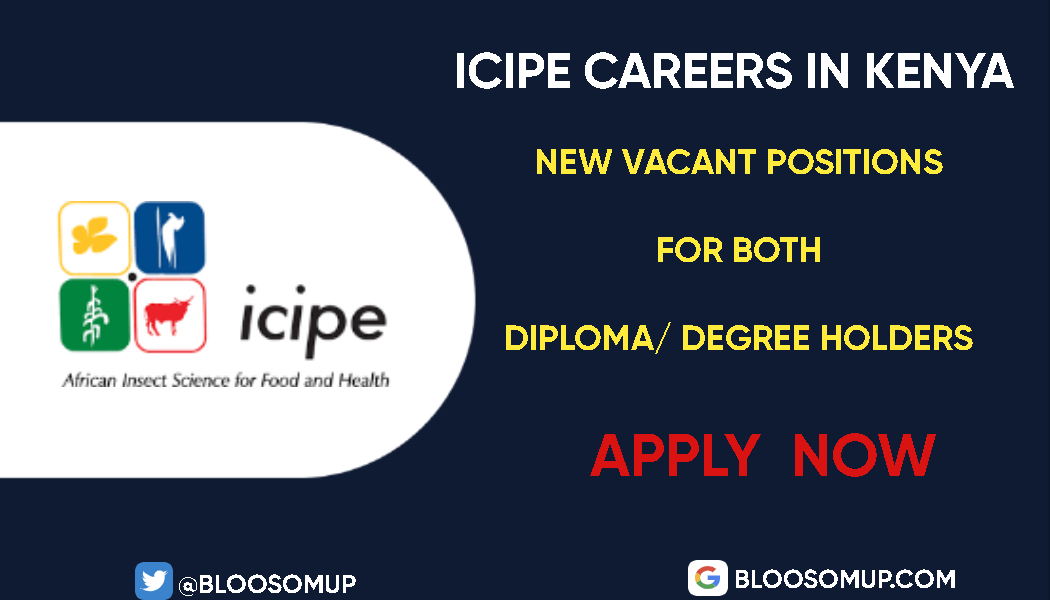ICIPE Careers in Kenya; Brief description:
The International Centre of Insect Physiology and Ecology (ICIPE) is a globally recognized research institution dedicated to the study of insects and their impact on agriculture, human and animal health, and the environment.
ICIPE Careers in Kenya; jobs list:
1. Mechanic/Driver
2. Research Officer I
3. Capacity-Building Assistant
4. Postdoctoral Fellow (SymbioVector Project)
last updated on 20th, March 2025
| HR/606/25 – POSTDOCTORAL FELLOW (SYMBIOVECTOR PROJECT) | icipe Thomas Odhiambo Campus | 04-Apr-25 GMT+3 | View Details |
| HR/607/25 – MECHANIC/DRIVER | icipe Duduville Campus | 20-Mar-25 GMT+3 | View Details |
| HR/608/25 – RESEARCH OFFICER I | icipe Duduville Campus | 26-Mar-25 GMT+3 | View Details |
| HR/609/25 – CAPACITY-BUILDING ASSISTANT | icipe Duduville Campus | 31-Mar-25 GMT+3 | View Details |
(ICIPE Career in Kenya) International Centre of Insect Physiology and Ecology (ICIPE): Transforming Agriculture, Health, and Environment in Africa
ICIPE Careers in Kenya; Introduction
The International Centre of Insect Physiology and Ecology (ICIPE) is a globally recognized research institution dedicated to the study of insects and their impact on agriculture, human and animal health, and the environment. Established in 1970 and headquartered in Nairobi, Kenya, ICIPE focuses on innovative and sustainable solutions to challenges related to insect pests, vectors of diseases, and beneficial insects like pollinators and silk producers.
Company Overview
- Full Name: International Centre of Insect Physiology and Ecology (ICIPE)
- Founded: 1970
- Headquarters: Nairobi, Kenya
- Industry: Scientific Research & Development
- Focus Areas: Agricultural development, pest control, human and animal health, environmental sustainability
- Operational Regions: Africa and beyond
- Website: www.icipe.org
History and Background
ICIPE was founded by Dr. Thomas R. Odhiambo, a visionary Kenyan scientist, with the goal of using insect science to solve critical challenges in food security, public health, and biodiversity conservation in Africa. Since its establishment, the organization has become a leader in biological pest control, disease vector management, and insect-based economic opportunities.
Mission and Objectives
ICIPE’s mission is to:
- Improve food security through insect pest management and pollination research.
- Protect human and animal health by controlling insect-borne diseases like malaria and sleeping sickness.
- Enhance environmental conservation and biodiversity.
- Empower communities through insect-based economic ventures such as beekeeping and silk production.
Research and Key Programs
1. Agricultural Pest Management
ICIPE develops eco-friendly solutions to combat destructive agricultural pests, ensuring food security and improved livelihoods. Some key programs include:
- Push-Pull Technology: An integrated pest management strategy that controls crop pests like the fall armyworm and stemborers while improving soil fertility.
- Biopesticides: Development of natural pest control solutions to replace harmful chemical pesticides.
- Fruit Fly Control: Research and biological interventions to protect horticultural crops from fruit flies, which cause significant post-harvest losses.
2. Human and Animal Health
Insects play a significant role in disease transmission. ICIPE conducts research on:
- Malaria and Mosquito Control: Innovative strategies to control malaria-transmitting mosquitoes, including repellents and environmentally friendly larvicides.
- Tsetse Fly Management: Development of traps and repellents to reduce tsetse fly populations, which transmit trypanosomiasis (sleeping sickness) in humans and animals.
3. Insect-Based Economic Development
ICIPE promotes insect farming as a source of livelihood for African communities. Programs include:
- Beekeeping (Apiculture): Training farmers in honey production and bee conservation.
- Silk Farming (Sericulture): Promoting silk production to boost rural economies.
- Edible Insects: Researching the potential of insects such as crickets and grasshoppers as a source of protein and nutrition.
4. Environmental Sustainability
ICIPE integrates environmental conservation with insect science by:
- Studying the effects of climate change on insect populations.
- Supporting conservation of pollinators like bees and butterflies.
- Encouraging agroecology practices to maintain biodiversity.
International Partnerships and Collaborations
ICIPE works with global and regional partners, including:
- The African Union (AU) and United Nations (UN) agencies.
- International Research Institutes like CGIAR and FAO.
- Universities and NGOs worldwide.
- Private Sector Partners for commercialization of research innovations.
Funding and Support
ICIPE receives funding from various sources, including:
- African Governments – Supporting research to improve local agriculture and health.
- International Donors – Organizations like the Bill & Melinda Gates Foundation, USAID, and the European Union.
- Private Sector Contributions – Collaborations with industries that commercialize biopesticides, improved seeds, and other insect-based products.
Impact and Achievements
- Over 50 years of groundbreaking insect research benefiting African farmers, health systems, and the environment.
- Development of over 300 scientific innovations used in sustainable pest management and disease control.
- Millions of farmers trained in sustainable agriculture, increasing crop yields and reducing losses.
- Significant contribution to the fight against malaria and sleeping sickness through insect vector control strategies.
Why ICIPE Matters
- Boosts agricultural productivity by reducing crop losses.
- Improves human and animal health through insect-borne disease control.
- Promotes economic empowerment through sustainable insect farming.
- Contributes to environmental conservation by promoting biodiversity-friendly solutions.
ICIPE Careers in Kenya; Conclusion:
ICIPE continues to lead Africa’s insect science revolution, providing innovative and sustainable solutions to some of the continent’s most pressing challenges. Through research, partnerships, and community engagement, the organization is shaping a future where insects are not just pests but opportunities for growth and sustainability.
For more details, visit www.icipe.org.





